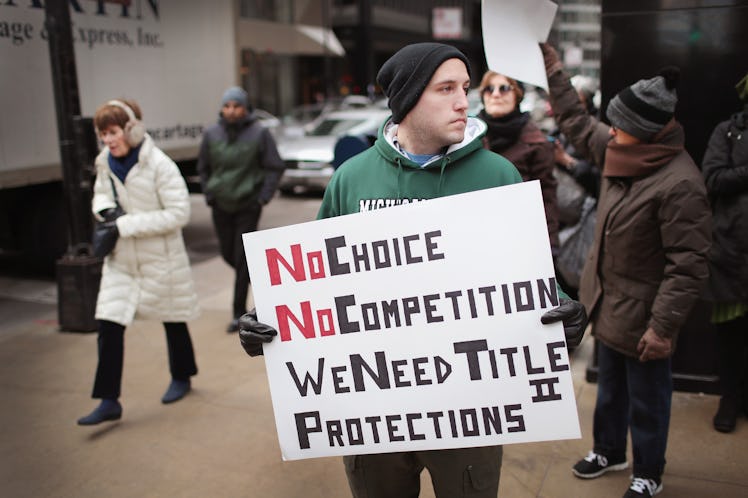
Want The FCC's Net Neutrality Decision Reversed? That Could Take Years
On Thursday, Dec. 14, the FCC's five-person board of commissioners will meet to vote on a plan that would essentially repeal a set of "net neutrality" rules that were established during the administration of former President Barack Obama. Since virtually the day the pending plan was announced by FCC chairman Ajit Pai, opponents of the proposal have been vocal. Meanwhile, online protests have tried to attract the attention of those who wonder, can net neutrality be saved?
If we're talking about the specific rules that were passed during the Obama administration, back in 2015, the answer is all but a certain no. The FCC's board of commissioners includes three Republicans, two of whom were on the board when the Obama-era rules were put in place two years ago and opposed the original plan. If all three Republicans vote as they are expected to, Pai's plan will go through.
What About Congress?
While many online protests call on Congress to help block a vote, there are only two realistic ways in which members of the House and Senate could save net neutrality. The first is for this Republican-majority Congress to have enough members put pressure on a majority-Republican FCC that the vote would be delayed.
That seems unlikely, not least because Congress is currently embroiled in debate and negotiations surrounding a massive tax bill and the effort to avoid a government shutdown. In other words, Congress' attention is elsewhere at the moment.
The second way is for Congress to address the way the internet is regulated once and for all by passing a binding law. That idea was pretty much echoed by one of the few members of Congress who have expressed views on the FCC's imminent decision. Rep. Mike Coffman (R-CO) wrote on Tuesday to Pai, calling for the chairman to delay the vote by using Pai's own words.
"As you stated in your dissent to the previous FCC’s open Internet proceeding," Coffman wrote, "‘A dispute this fundamental is not for us, five unelected officials, to decide. Instead, it should be resolved by the people’s elected representatives, those who choose the direction of government—and those whom the American people can hold accountable for that choice.'"
But that, too, would take a while, especially since there's been no indication that internet regulation is part of Congress' agenda, like others subjects are, including health care, tax reform, infrastructure, and immigration reform. If legislation on internet regulations is to come, it'd likely be a long way away.
Even some of the companies that, in the past, helped call attention and create pressure for net neutrality rules (like Google and Facebook) are quieter on the issue this time around. Their silence, of course, doesn't help the cause. Ultimately, the only thing that may bring back net neutrality rules that are similar to the ones passed during the Obama administration is the very event that looks likely to bring those rules to an end: a regime change. It's not uncommon for a previous presidential administration's policies to be reversed when those policies aren't cemented in law. That's why policies like DACA and net neutrality were most vulnerable when Republicans won the White House. On the flip side, a law like the Affordable Care Act has proven itself near impossible to repeal.
With a change in the White House after the 2020 election would come another shift in the balance on the board of commissioners at the FCC. If there's an appetite on that board for net neutrality reform (under a President Gillibrand, Warren, Sanders, or any other Democrat) then we might be right back where we started in 2015.